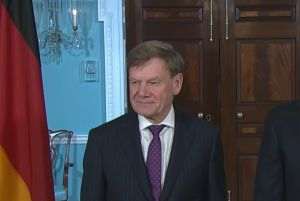The conditions that the PSD, through the voice of interim president Sorin Grindeanu, is putting to the governing coalition - namely the reduction of state privileges and agencies - seem to represent nothing more than a hiding of the garbage under the rug, as long as behind the most powerful agency in the Romanian state - the Agency for Monitoring and Evaluation of Public Enterprises Performance (AMEPIP) - sits the shadow of the powerful social-democratic leader, Deputy Prime Minister Marian Neacşu.
The most recent episode is illustrative: the selection procedure for the independent expert - the person or company that would have chosen the future management of the agency - was canceled after a single offer was received, from a company that did not meet the criteria in the specifications. The General Secretariat of the Government reported that this was a simple compliance issue. But the fact that the procedure was resumed on August 11, 2025, with a deadline of August 20, reinforces the perception that such delays and reruns are not administrative accidents, but mechanisms by which the process remains under political control. In a context where the legal requirements for this type of selection are strict and the supply of real experts is limited, each bureaucratic failure seems to serve to maintain the status quo. AMEPIP was created in 2023 with the promise of political decision-makers that it would remove state-owned companies from party control. Government Decision no. 617/2023, coupled with amendments to Emergency Ordinance 109/2011 and Law 187/2023, presented the agency as a "guardian” of corporate governance. In official speeches, there was talk of transparency, efficiency and professionalization. In practice, the agency quickly became an example of how bureaucratic apparatuses can be politically captured. The exorbitant salaries - 26,400 lei gross for the president, 23,100 lei for vice-presidents - and 50% bonuses were justified by the need to attract "top professionals”. However, in December 2023, these revenues were increased by another 10,000 lei gross, a decision interpreted as a consolidation of privileges for the leadership. Independent observers and even European Commission officials began to see AMEPIP more as an institution for perpetuating political benefits than as an engine for reform. The Victor Moraru case became the symbol of this suspicion. A member of the General Secretariat of the Government and close to Deputy Prime Minister Marian Neacşu, Moraru was directly involved in the selection process of AMEPIP's leadership, including participating in the formation of the commission that was to make the choice. The result was predictable: Victor Moraru was appointed vice-president of the agency. Brussels reacted immediately, considering the situation a blatant conflict of interest and criticizing the lack of transparency. The media documented this case extensively, and the pressure of the European Commission, which conditioned the approval of payment request no. 3 from the funds allocated through the PNRR on the depoliticization of the agency, led Prime Minister Marcel Ciolacu to demand the resignation of the AMEPIP management selected in the first year. Victor Moraru did not disappear from public life, however: he later participated in the selection of the Transelectrica management, a process managed by a company - Pluri Consultants Romania - which political sources claim has close ties to Marian Neacşu. The resignations in the summer of 2024 deepened the institutional crisis. Amidst pressure from the European Commission, President Mihai Precup and the two vice-presidents left en bloc, officially to protect the credibility of the agency. "The European Commission did not give in and conditioned the unblocking of payment request number 3 on the dismissal of the AMEPIP management,” government officials quoted by Euronews Romania and Europa FM said at the time. Their resignation, justified as a measure to maintain credibility with European partners, highlighted the fragility of the institution and the immediate geopolitical impact of governance slippages.
The interim position was taken over first by Ciprian Hojda, then by Corina Creţu, former European Commissioner for Regional Policy. Her appointment seemed to bring added experience and legitimacy, but the mandate was not extended beyond the six months provided for by law, and the agency was once again left without a valid leader.
During this time, the agency went through periods of institutional reorganization, adapting to the new legislative provisions brought by the amendments to Emergency Ordinance 109/2011 and Law 187/2023, which redefined the way in which state-owned companies should be monitored and evaluated. Stricter procedures were created for the selection of the management of these enterprises, and AMEPIP was placed at the center of this process, with the role of guaranteeing that no compromises were made regarding the competence and integrity of the candidates. However, implementation was often slowed down by the contested or unsuccessful procurement processes , such as the recent one, when the support of an independent expert was needed for the positions of president and vice-presidents of the agency, but the only submitted offer did not comply with the requirements of the specifications and had to be rejected.
The European Commission has not changed its position: the money from the PNRR will come only after a real reform and the depoliticization of the agency. External criticism has been complemented by internal ones: in June 2025, Prime Minister Ilie Bolojan described AMEPIP as "a form without substance”, an institution that has produced nothing concrete except sterile papers and procedures. The sharp and relentless criticism is supported by the unjustified payments made within AMEPIP, the creation of an inefficient bureaucratic apparatus and a high level of politicization in the state-owned companies monitored by the agency. Instead of being a guarantor of competence in state-owned companies, the agency has come to symbolize exactly what it was supposed to eliminate: politicization well-packaged in bureaucratic formalities. The procedure resumed in August 2025 could be the last chance to save AMEPIP's credibility or, on the contrary, another episode in a long line of broken promises and mechanisms controlled from the shadows.
















































